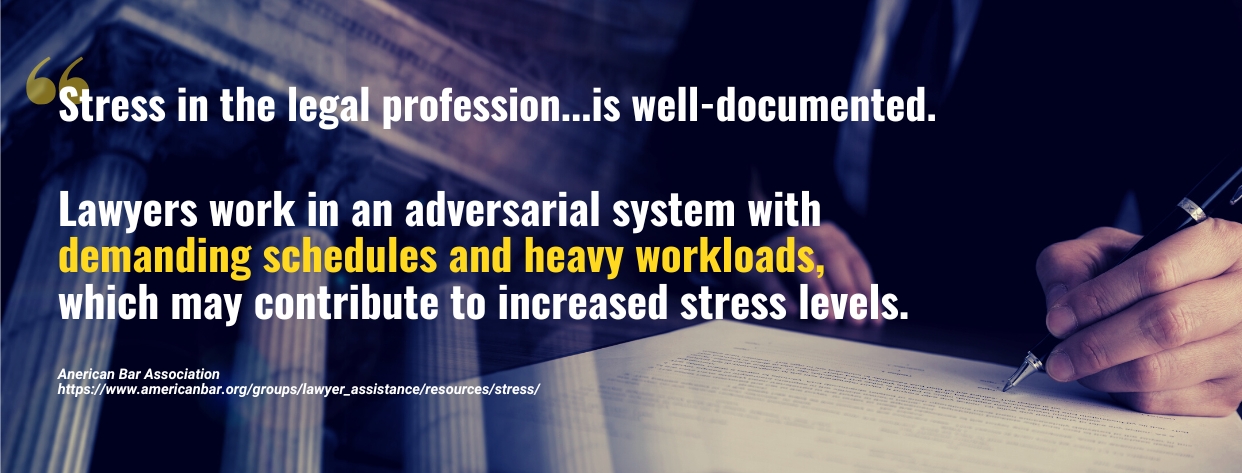Find Your Perfect School
The legal profession can be challenging and rewarding. However, some lawyers may feel unfulfilled, burned out, or ready for a change. Switching careers can be daunting, but it can also lead to new opportunities, personal growth, and greater job satisfaction.
Other careers to consider: Great Career Changes for Accountants
Why Lawyers Consider Alternative Legal Careers
Here are some positive reasons why lawyers may want to switch careers:
Pursuing a Passion
Many people pursue a law degree because they are passionate about the job, justice, advocacy, or problem-solving. However, over time, they may find that their passion for law has faded. The work they do for their law firms may be overshadowed by other interests, thus searching for an alternative career path.
Switching careers can be an opportunity to pursue a new passion, whether in the arts, entrepreneurship or having their own business or non-profit sector. By following your passion, you will soon find out that a career change is what you need to have personal growth and fulfillment.
Greater Flexibility
The legal profession is often associated with long hours, high stress, and rigid schedules. Many people in the legal field may crave greater flexibility and more work-life balance. Transitioning into a new career that offers enhanced adaptability, whether through part-time work, remote work, or a more flexible schedule, may thrive better in such a work setup.
Those in the legal practice who switch careers may also find themselves thriving in a field that is less prone to burnout and stress, allowing them to handle challenges more effectively and lead more fulfilling lives.
New Challenges
For some people with a law degree, the daily grind of legal work may become repetitive or dull over time. Switching careers can offer new challenges and opportunities to learn and grow, which can be powerful motivators for legal professionals who may be looking to change careers.
If you’re a former lawyer who shifts to a different career, you may find yourself in a new profession that requires you to learn new skills, solve new problems, and think creatively. This can be exciting and rewarding, as you can develop new areas of expertise and build a new professional identity. Aside from that, you might feel that you’ve learned enough in your legal profession and are ready to take on new challenges to grow and develop professionally.
Opportunities for Growth
Many attorneys may feel their professional growth is limited within the legal profession. This is why you might feel that finding an alternative career will offer new opportunities for growth and advancement.
As a former lawyer, being in a new field allows you to take on new roles, develop new skills, and assume greater leadership responsibilities. All this can be strong motivators for someone who feels stuck or stagnant in their legal career.
Pursuing a new profession in another legal practice area or becoming a business owner exposes you to new opportunities for growth, as you can work in a different cultural environment, pursue a different type of work-life balance, or learn a new language.
Making a Difference
Lawyers are often drawn to legal practice because they want to make a difference. However, some may feel their work does not have the impact they hoped for.
By transitioning into a new profession, you’ll find more opportunities to make a positive difference in the world through social work, public service, or advocacy work.
For example, if you’re passionate about social justice, you may be interested in pursuing advocacy work, like working for non-profit organizations, advocacy groups, or government agencies that focus on environmental justice, human rights, or civil rights. All this will help you find new meaning and purpose in your work.
Improved Work-Life Balance
The legal profession is known for high stress, demanding workloads, and hectic schedules, which can affect a lawyer’s physical and mental well-being and personal relationships. Many former lawyers are looking into changing careers to have more work-life balance.
According to the American Bar Association (ABA), “work-life balance is a metaphor.” This is especially true in the legal profession because your personal life will have to take a back seat occasionally.
So, if you want an improved work-life balance, taking on a new job may be your answer. After all, having a work-life balance improves your physical and mental health and your job satisfaction, motivating you to keep improving your performance.
Increased Job Satisfaction
Venturing into a new career can lead to increased job satisfaction. Doing so allows you to work in a field that aligns more closely with your values, interests, and skills. This can lead to a sense of fulfillment and purpose that may have been lacking in your growth. By finding a career that brings you joy and satisfaction, you’ll be able to enjoy a more fulfilling and meaningful professional life.
Furthermore, check this out: Top Accelerated Courses for Fast Career Change
Best Alternative Careers for Lawyers
The changing nature of the legal industry has also become a significant driver for many lawyers to reconsider their career paths. For one, the rise of legal technology and alternative service providers has now been automated. These innovations are making a law career or legal work less meaningful and limited to the personal and professional goals of legal professionals.
As a lawyer, you have many transferable legal skills gained from legal training or law school, and as you practice law, you are well-suited for various professions outside of law practice.
Legal Sales Professional
A legal sales professional sells legal services to clients. Other tasks include:
- Building relationships with potential clients through networking events and connecting through social media.
- Conducting market research to spot potential clients and understand their needs.
- Pitching legal services to prospects through sales presentations, proposals, and contracts.
- Managing client relationships by ensuring fast and efficient delivery of legal services and maintaining client satisfaction at all times.
- Meeting sales targets to earn a certain income level, usually on a commission basis.
One of the requirements for being a legal sales professional is to have a bachelor’s degree in Law, Business, or Marketing. You must also have experience working in a law firm and have strong sales skills.
It’s also important to have strong communication and analytical skills, deep industry knowledge, and a goal-oriented mindset to smooth your career transition from lawyer to legal sales professional.
Legal Writer
If you have a knack for writing, be a legal writer whose job includes the following:
- Drafting legal documents that are clear, concise, and legally sound.
- Conducting research, analyzing legal issues, and ensuring documents comply with applicable laws and regulations.
- Reviewing and revising legal documents drafted by other legal professionals, ensuring clarity, accuracy, and legal soundness.
- Writing legal articles and blog posts to be published in websites or legal journals.
To switch careers from being a lawyer to a legal writer, aside from having a law degree, you must also have the following:
- Strong writing skills to be able to communicate complex legal concepts in a more understandable way
- Deep knowledge of legal concepts, such as statutes, case laws, and regulations
- Research skills and experience in using legal research databases, such as Lexis+, Nexis Uni, Bloomberg Law, and VitalLaw, among others
- A high degree of attention to detail to be able to create error-free legal articles or blog posts
- Ability to work independently and have time management skills to ensure you can submit deliverables on time.
Law Professor
You’ll make an excellent academic professional if you’re passionate about educating and training future legal professionals.
Your job as a law professor includes the following:
- Preparing and delivering lectures, leading class discussions, and facilitating group assignments or projects.
- Conducting research and publishing books and articles on legal topics.
- Contributing to the broader field of legal scholarship.
- Providing advice to students on course selections, career options, and other related matters.
- Serving on committees, including curriculum, faculty review, and admissions committees.
- Participating in academic events, such as conferences, and presenting their research to their peers to contribute to the legal community.
To be a law professor, you need to have the following:
- A Juris Doctor degree earned from an accredited law school
- Additional degrees, such as a Master of Laws (LL.M.) or a Doctor of Juridical Science (SJD.)
- Practical experience in the legal field (i.e., law practice as an attorney or as a law clerk)
- Published academic journals or other publications and a solid track record of academic writing and research
- Teaching experience as a teaching assistant, instructor, or adjunct professor
Marriage and Family Therapist
The transition from being a lawyer to a marriage and family therapist may be easier if you have experience dealing with divorce and family law while still practicing law.
Some of your primary responsibilities as a marriage and family therapist include the following:
- Identifying client needs and issues through assessments and evaluations.
- Developing treatment plans that address clients’ specific concerns.
- Providing therapy sessions for individuals, couples, and families.
- Educating families on communication skills, stress-management techniques, and conflict-resolution strategies.
- Guiding clients in coping with difficult emotions and situations.
- Staying up-to-date on the latest research and best practices in the legal sector.
If you want to leave law and become a marriage and family therapist, you will be required to do the following:
- Master’s in Marriage and Family Therapy, counseling, or any related field
- Completion of 2,000 to 4,000 hours of post-degree supervised clinical training
- Accreditation from counseling programs, such as the CACREP-Council for Accreditation of Counseling & Related Educational Programs and the COAMFTE-Commission on Accreditation for Marriage and Family Therapy Education.
- Important qualities, such as compassion, and transferable skills, including listening, interpersonal, organizational, and speaking skills
Financial Educator
A financial educator teaches individuals and groups about financial literacy to help them make informed decisions about money and wealth. You must also educate others about budgeting, investing, saving, retirement planning, financial goal-setting, and debt management.
Other tasks include:
- Conducting classes and workshops on financial topics for individuals, community organizations, schools, or businesses.
- Providing one-on-one coaching or counseling on financial planning and helping people set financial goals and develop strategies.
- Developing articles, webinars, videos, and other educational materials on financial topics.
- Collaborating with other financial professionals, such as accountants and financial planners, to provide comprehensive financial advice to clients.
Start-Up Founder
If you’re a lawyer with an entrepreneurial spirit and a desire to create new products, you can change careers as a start-up founder. It is a superior career alternative for lawyers pursuing another role because it offers flexible working hours and more control over their work-life balance.
As a start-up founder, your responsibilities include:
- Develop a business plan outlining your company’s mission, vision, and goals and create a strategy for achieving them.
- Assembling a team composed of employees, contractors, or advisors who may be able to help keep the business running.
- Securing funding to launch the company by pitching your business idea, attending networking events, and building relationships with potential investors.
- Developing and testing a product or service and ensuring that it meets industry standards and the needs of your target audience.
- Formulating a marketing and sales strategy that will make your product or service attractive to potential customers.
- Managing the business’s day-to-day operations, hiring new employees, and making important decisions.
To be an effective start-up founder, you need a mentor with relevant entrepreneurship experience. You may also take entrepreneurship classes and attend events for start-up companies to learn about the industry you are interested in venturing into and build a network.
In-House Lawyer
An in-house lawyer or in-house counsel is a lawyer who a company or organization employs to provide legal advice and support in legal issues that arise within the organization. As an in-house lawyer, you will be a part of a company’s legal department, ensuring that the company fully complies with relevant laws and regulations.
Your role will involve the following:
- Reviewing and drafting contracts, including vendor agreements, employment contracts, and other legal documents.
- Ensuring the company complies with all relevant laws and regulations.
- Identifying potential legal risks and formulating strategies to mitigate those risks.
- Representing the company in legal disputes or sourcing outside counsel to represent the company.
- Managing the company’s intellectual property portfolio, including patents, copyrights, and trademarks.
Requirements for the position of in-house counsel include:
- A Juris Doctor degree
- Minimum of six years of experience within a corporate legal department or law firm with an emphasis on patent and intellectual property litigation
- In-depth knowledge of the invention process
- Strong communication skills
- Ability to analyze design and utility patent invalidity and noninfringement issues, as well as trademark protectability
- Experience working closely with worldwide counterparts in developing case strategies
- Membership in the National Association of Patent Practitioners (NAPP)
Legal Journalist
As a journalist, you can use your legal background and expertise to analyze court cases, report on legal issues, and provide legal commentary. You can work for magazines, newspapers, online media outlets, or television stations.
Some of the main tasks you will be doing as a lawyer turned journalist include:
- Covering legal issues and court cases, such as landmark decisions or high-profile trials, should include conducting interviews to provide in-depth analysis.
- Investigating relevant persons to uncover stories and reveal legal wrongdoing or misconduct.
- Researching and writing reports, articles, or other forms of content to provide clarification to the general public.
To become a legal journalist, you have the following:
- Valid law degree at the undergraduate or postgraduate level from a recognized institution
- Strong understanding of legal concepts, terminologies, court processes, and legal procedures
- Writing skills to be able to write clear, concise, and informative articles on legal issues
- Research skills to find and evaluate sources of information related to legal issues
- High ethical standards to avoid conflicts of interest, maintain objectivity in the reports and ensure reports are fair and accurate
- Professional experience working in the legal field as a lawyer, paralegal, or legal researcher.
Mediator
If you’re a lawyer considering a career change but do not want to leave law entirely, you can consider a profession closer to your heart – mediator.
Being a mediator provides new and rewarding opportunities by helping parties peacefully reach a mutually acceptable resolution.
Some of the most important tasks you will be taking on as a mediator include:
- Creating a safe and neutral environment for parties to be able to express their concerns and needs, as well as listen to the other party’s perspective.
- Identifying underlying issues that may be causing the problem.
- Helping parties explore different options to resolve the dispute by brainstorming solutions with them.
- Helping parties find c common ground so they can compromise instead of pursuing a costly legal battle in court.
- Drafting written agreements outlining the terms and conditions clearly, concisely, and legally.
To be a mediator, you need to comply with the following requirements:
- Completion of Master of Legal Studies or Studies in Law
- Completion of two years of compliance-related work experience
- Completion of 20 to 40 hours of a comprehensive mediator training course
Private Equity Associate
A private equity associate works for a private equity firm and is responsible for supporting the firm’s investment activities. Some of the critical responsibilities of a personal equity associate include the following:
- Identifying potential investment opportunities by researching industries and companies, attending events and conferences, and networking with relevant contacts.
- Conducting due diligence by researching company financials, operations, and management teams to evaluate the opportunities and potential risks associated with the investment.
- Building financial models to assess potential investments by creating detailed projections of future financial performance based on different scenarios.
- Executing deals with senior members of the team to negotiate structure and terms.
- Managing the portfolio company, working with the management team to develop and implement growth strategies, identifying opportunities for value creation, and monitoring financial performance.
- Managing relationships with investors, including creating reports and presentations for investors, responding to inquiries, and providing updates on portfolio performance.
Some of the most important requirements and qualifications to become a private equity associate include the following:
- Valid certifications, such as Chartered Financial Analyst (CFA), Chartered Private Equity Professional (CPEP), Chartered Investment & Management Accountant (CIMA), Financial Risk Manager (FRM), or Certified Financial Planner (CFP)
- Bachelor’s degree in finance, accounting, mathematics, economics, or statistics with a minimum of three years of relevant work experience
- Master’s in Finance
- Relevant skills, such as accounting, communication, data analysis, and problem-solving skills, as well as in-depth industry knowledge
Other Exciting Career Options Former Lawyers Can Consider
Those who do not want to be a lawyer anymore and look for something less stressful or less demanding but also do not want to be part of the corporate world can take on these jobs instead:
- A career coach helps individuals navigate their career paths and achieve professional goals. Your professional background and experience in law are helpful in guiding them on resume writing, interview preparation, and career advancement plans. Moreover, you can provide legal guidance on employment laws and regulations, contract negotiations, and other legal aspects of a client’s career.
- A podcaster uses knowledge and experience to create engaging and informative podcasts that help people understand the legal system and make informed decisions on legal matters. You can discuss legal topics, current issues, and events to educate people and raise awareness. You may also interview experts in the legal sector to gather valuable insights and advice.
- Digital Marketers develop and implement digital marketing strategies using their legal expertise and knowledge to ensure that all marketing campaigns that align with a client’s goals and comply with industry standards and regulations are ethically sound. You will also formulate strategies for social media marketing, content marketing, email marketing, SEO or search engine optimization, and paid advertising. Your legal background will guide you in ensuring intellectual property protection, contract negotiations, and other digital aspects related to digital marketing.
- A Climate and Environmental Advocate promotes and advances environmental sustainability and creates awareness to combat climate change. As a former lawyer, you can develop policies and legislation to protect the environment. You may also guide organizations and communities in developing techniques that will help them reduce carbon emissions and promote sustainable and ethical practices. You will also speak publicly, work with advocacy groups, and represent clients in environmental cases, including environmental degradation and natural resource management.
- An Information and Security Consultant provides guidance and advice to organizations and companies on protecting their sensitive information and data from security breaches and cyber threats. Your knowledge of the law will help you ensure that clients comply with relevant laws and regulations related to data privacy and security. You may also be tasked to conduct risk assessments, provide training on best practices, and develop security procedures and policies. Additionally, you will help clients navigate the legal aspects of data privacy and information security, including data protection laws, liability issues, and contractual obligations.
Challenges Lawyers Changing Careers May Face
While there are many new opportunities and benefits to pursuing an alternative job or a dream job, there are also challenges that a lawyer like you may face when making the transition.
For one, you may lack relevant experience in the field you desire. Yes, you may have many applicable skills, such as critical thinking, problem-solving, and legal analysis, but they may not be directly relevant to your chosen role. This is why you must enroll in a related course or pursue a degree and gain specialized experience to have the edge over other candidates.
Transitioning to a new role may be quite a struggle for some former lawyers. Networking, building new skills, and finding the right job opportunities require a lot of time and effort. This is why you need to prepare yourself to start at the bottom.
By leveraging the transferable skills you have gained from the years you have spent in legal practice, you’ll soon find a fulfilling and rewarding job with more work-life balance, job satisfaction, and growth opportunities.
Final Thoughts
The legal profession will continue to be an integral part of society. It has paved the way for those in legal practice to gain valuable skills, such as legal analysis and research, communication, critical thinking, problem-solving, attention to detail, and time management, which they can use to find more opportunities to grow personally and professionally.
Before moving on to what you like, though, you must ask yourself what you will gain the most when making that shift. Once you’ve convinced yourself that you want to leave law, get the list of the most suitable career options for you. Then, thoroughly plan your next move to make the process less overwhelming.
While leaving the legal industry may be a nerve-wracking experience, using the right approach will help you successfully navigate all the obstacles of career transition and find the most fulfilling job that will make you happy, contented, and accomplished all at the same time.
Before you go, see: Low-Stress Careers With Jobs That Pay Well






